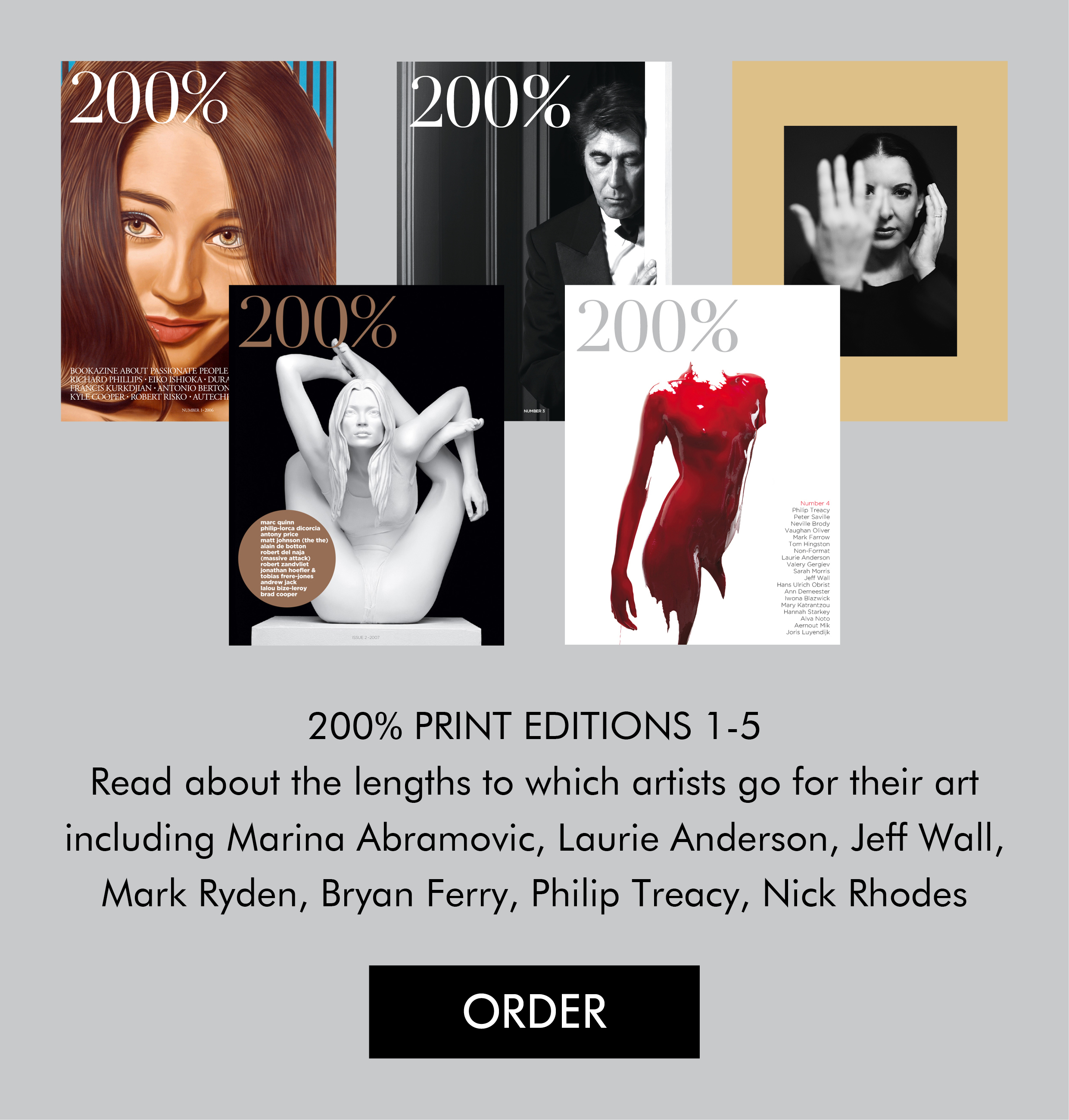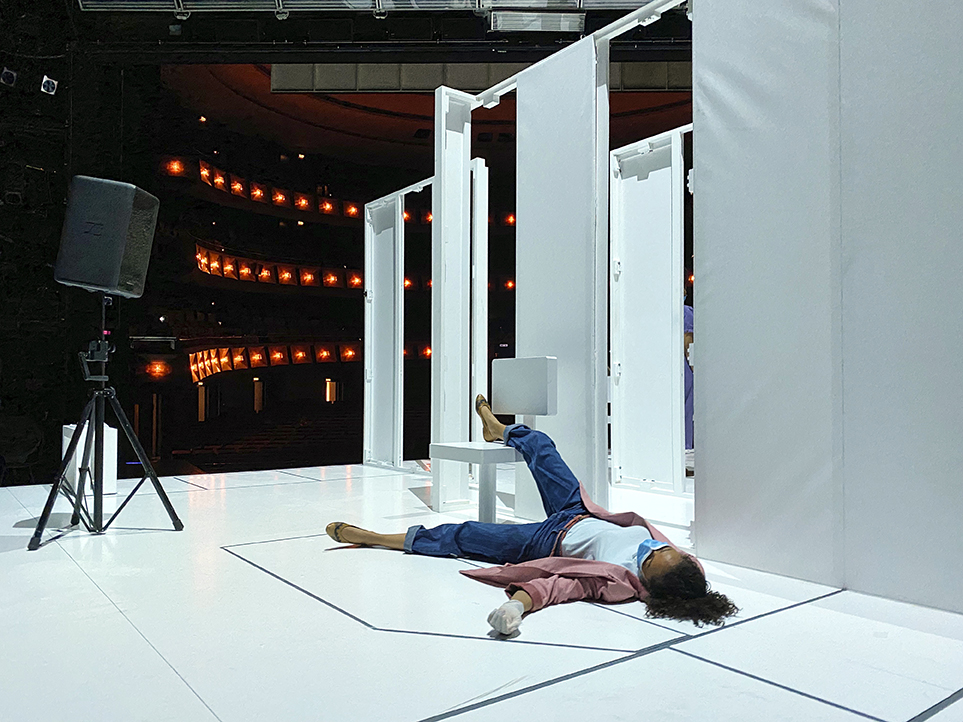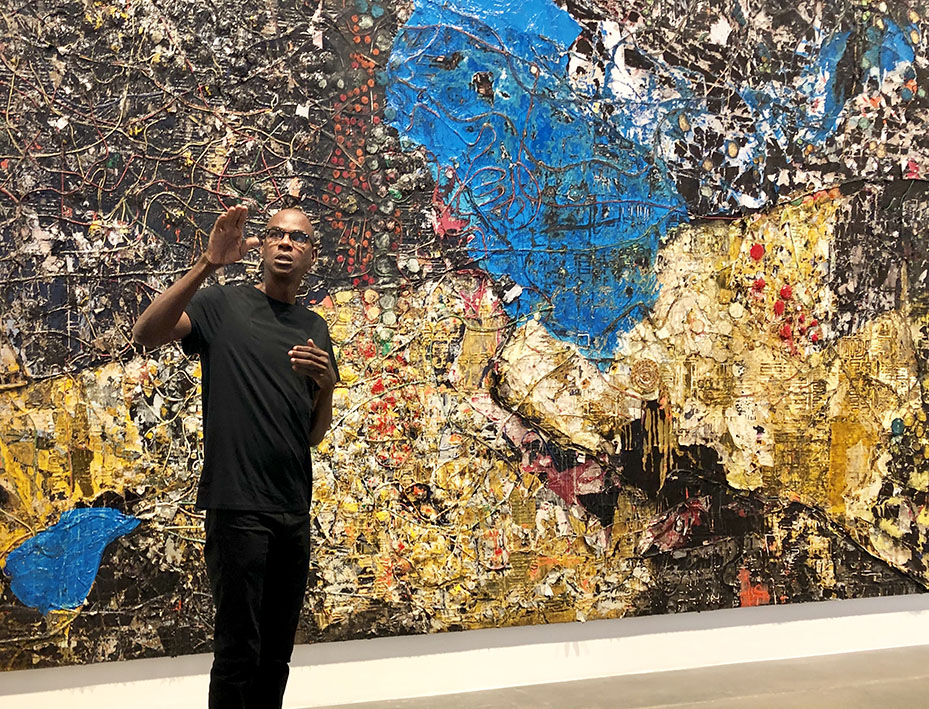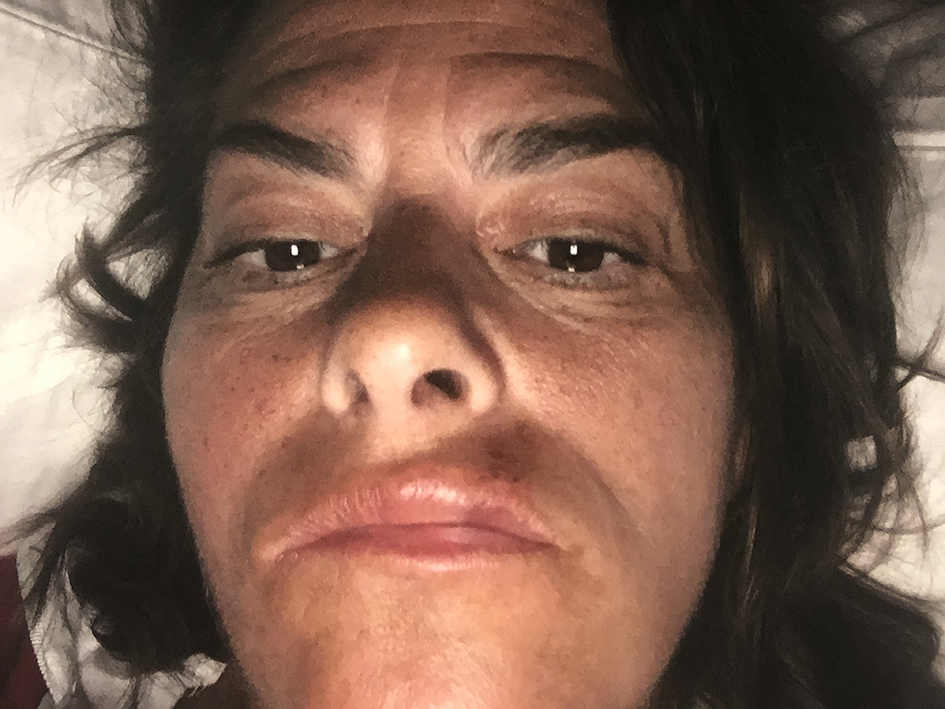 “Ideas come to find you”, says Stuart Staples, the lead singer of British indie band Tindersticks, when he talks about how his song lyrics are conceived. His words are peppered with a slight stutter that gives his voice an unlikely uncertainty for a man who probably has one of the most recognizable vocals in indie music.
There is barely a difference between Staples’s speaking and singing voice when we talk with him about his vocals. In our Spellbinding Voices play list we commented that “His worn out voice sounds like it’s been wrecked by cigarettes and alcohol”. Listening to Tindersticks’s song ‘Talk To Me’ there is also something sexy, erotically charged, about his low voice that puts the listener under a spell.
In this interview we discuss with Staples his belief of wanting to make every syllable and the meaning behind it believable (“Without that there is nothing”), his ambition in his song writing to leave a sense of space for the listener to explore, his duets with Isabella Rossellini and Lhasa de Sela, and his strong conviction that a struggle to express one’s self is almost at the heart of making something that has an effect on people.
200%: When did you start singing?
Stuart Staples: I don’t think I was ever driven by singing or just for the idea of making things. I kind of fell into the need to put a band together even though I couldn’t play anything. It was more about the ideas that were in my head and I started to sing. It’s not about when I started singing; I probably wanted to start singing when I realized that I wanted to make things, to make music and to explore the ideas that I had.
200%: Was it something like when I am not in a band I can do it myself?
SS: The singing is part of what I do but I think it carries all the way through to the sonics of the record. A song like ‘Talk To Me’ is imagined and my voice found its place in it. It said what it needed to say in it. The song was never driven by the singing, it was driven by a need to create this feeling.
200%: When did you realize you were a talented singer and had a special voice?
SS: There are some people that get a strong feeling from my voice. And… there are a lot more people that don’t [laughs]. It’s a blessing and a curse. No, to be serious, I think when we made our first album and found an audience I realized that people were listening to my singing and that it had an effect on people. I never really thought about myself as a talented singer.
200%: Whilst you write the lyrics of your songs do you sing them aloud to see how they work melodically and rhythmically?
SS: With the words I never work on paper. All of the words have come from being sung. It’s something that I do when I am walking – then I am thinking about the thoughts that are occurring in my head. The songs are ‘written’ in this way. Most of them have never been written down. I think that ideas come to find you. You have to be open to that. Once it gets inside of you, you are in the process of trying to capture the idea in a piece of music. It could drive you mad, but if that process wasn’t there, I would go mad. Ideas come to you and they demand fulfillment.
200%: Some people say your voice is sexy or erotically charged. How would you describe your own singing voice?
SS: I would hate it if it was devoid of it. It’s about the song and what the song demands. It’s about a desire to reach for something, to touch something: that kind of initial moment, feeling of inspiration is for what everything stands.
200%: Do you do role-play in your lyrics when you perform them?
SS: I wouldn’t call it role-play: I am conscious that I try to get in to a particular state of mind to be ‘inside’ the songs. If I stop believing in a song, or if I’ve sung it too many times, I find myself being just a guy with a voice and a microphone. I think you have to believe in every syllable and the meaning behind it. Without that there is nothing.
200%: You once said in an interview that it takes years to grow your voice. Do you think you’ve found your voice now?
SS: Hum, I am getting closer. I would say the voice is a part of the growth, but it’s so wrapped up with the songs and the songs you write; it’s a delicate relationship as it’s the songs that push the growth.
200%: Do you think that your voice has become more relaxed through the years. Listening to your first recordings with Tindersticks, and even Asphalt Ribbons, in comparison with the later album you can almost sense a physical struggle.
SS: I never feel far away from a struggle and if I ever experience an art that feels too easy I feel a kind of barrier. I think the struggle is really important. A struggle to express one’s self is almost at the heart of making something that has an effect on people. It doesn’t get any easier to move from feeling something to actually making it into a song. That struggle doesn’t get any easier. My singing may be more relaxed but the struggle is always there.
“Ideas come to find you”, says Stuart Staples, the lead singer of British indie band Tindersticks, when he talks about how his song lyrics are conceived. His words are peppered with a slight stutter that gives his voice an unlikely uncertainty for a man who probably has one of the most recognizable vocals in indie music.
There is barely a difference between Staples’s speaking and singing voice when we talk with him about his vocals. In our Spellbinding Voices play list we commented that “His worn out voice sounds like it’s been wrecked by cigarettes and alcohol”. Listening to Tindersticks’s song ‘Talk To Me’ there is also something sexy, erotically charged, about his low voice that puts the listener under a spell.
In this interview we discuss with Staples his belief of wanting to make every syllable and the meaning behind it believable (“Without that there is nothing”), his ambition in his song writing to leave a sense of space for the listener to explore, his duets with Isabella Rossellini and Lhasa de Sela, and his strong conviction that a struggle to express one’s self is almost at the heart of making something that has an effect on people.
200%: When did you start singing?
Stuart Staples: I don’t think I was ever driven by singing or just for the idea of making things. I kind of fell into the need to put a band together even though I couldn’t play anything. It was more about the ideas that were in my head and I started to sing. It’s not about when I started singing; I probably wanted to start singing when I realized that I wanted to make things, to make music and to explore the ideas that I had.
200%: Was it something like when I am not in a band I can do it myself?
SS: The singing is part of what I do but I think it carries all the way through to the sonics of the record. A song like ‘Talk To Me’ is imagined and my voice found its place in it. It said what it needed to say in it. The song was never driven by the singing, it was driven by a need to create this feeling.
200%: When did you realize you were a talented singer and had a special voice?
SS: There are some people that get a strong feeling from my voice. And… there are a lot more people that don’t [laughs]. It’s a blessing and a curse. No, to be serious, I think when we made our first album and found an audience I realized that people were listening to my singing and that it had an effect on people. I never really thought about myself as a talented singer.
200%: Whilst you write the lyrics of your songs do you sing them aloud to see how they work melodically and rhythmically?
SS: With the words I never work on paper. All of the words have come from being sung. It’s something that I do when I am walking – then I am thinking about the thoughts that are occurring in my head. The songs are ‘written’ in this way. Most of them have never been written down. I think that ideas come to find you. You have to be open to that. Once it gets inside of you, you are in the process of trying to capture the idea in a piece of music. It could drive you mad, but if that process wasn’t there, I would go mad. Ideas come to you and they demand fulfillment.
200%: Some people say your voice is sexy or erotically charged. How would you describe your own singing voice?
SS: I would hate it if it was devoid of it. It’s about the song and what the song demands. It’s about a desire to reach for something, to touch something: that kind of initial moment, feeling of inspiration is for what everything stands.
200%: Do you do role-play in your lyrics when you perform them?
SS: I wouldn’t call it role-play: I am conscious that I try to get in to a particular state of mind to be ‘inside’ the songs. If I stop believing in a song, or if I’ve sung it too many times, I find myself being just a guy with a voice and a microphone. I think you have to believe in every syllable and the meaning behind it. Without that there is nothing.
200%: You once said in an interview that it takes years to grow your voice. Do you think you’ve found your voice now?
SS: Hum, I am getting closer. I would say the voice is a part of the growth, but it’s so wrapped up with the songs and the songs you write; it’s a delicate relationship as it’s the songs that push the growth.
200%: Do you think that your voice has become more relaxed through the years. Listening to your first recordings with Tindersticks, and even Asphalt Ribbons, in comparison with the later album you can almost sense a physical struggle.
SS: I never feel far away from a struggle and if I ever experience an art that feels too easy I feel a kind of barrier. I think the struggle is really important. A struggle to express one’s self is almost at the heart of making something that has an effect on people. It doesn’t get any easier to move from feeling something to actually making it into a song. That struggle doesn’t get any easier. My singing may be more relaxed but the struggle is always there.
 200%: As a singer-songwriter you completely expose yourself, with no filter, or mask. Is being personal what it is about, in that you should write and sing about things that mean something to you, no matter how personal it is?
SS: Yeah, but I don’t tend to like songs that are graphic or performed in a fabricated manner. I think it’s very important that the feelings are strong. I mean it’s a strong feeling that makes you want to write. It’s not a descriptive or storytelling process. It’s more about finding the music and finding the words to hold that feeling within it. My songs from the last twenty years are similar to writing a diary, but it is abstract. I never want to explain the actual details of what happened or the process of something. It’s more about finding the words and music to hold that feeling of the event.
200%: So you leave it up to the listener to generate meaning?
SS: It’s not that I design for the listener. It’s just how I feel how things should be, having ambiguity and mystery within something; not accepting that things are black and white. They are mostly kind of gray. I want to leave that sense of space: for the listener to explore is really important as they can bring something of themselves to what they’re experiencing.
200%: Has your voice changed over the years; if yes how has it changed?
SS: It’s definitely changed and I think that’s a real kind of journey. Our third album had a kind of self awareness that I don’t think was part of the first two albums. They are kind of pure in that way. I never sung things more than once or twice, but that was because I was more excited getting behind the mixing desk to mess around with the songs. The singing then was somewhat less important than the sense of atmosphere on these records. The actual soundscape of the record was a driving force for me. It fascinated me that something you’ve written becomes a finished piece of music. It’s another world into which you step. With the album ‘Simple Pleasure’ I felt a need to concentrate on my singing and I distinctly felt that I was hitting a glass feeling. I couldn’t do what I wanted to, but I could see beyond this kind of barrier. It was a gradual process to record solo records and the second solo album ‘Leaving Songs’ was focused on producing a singer-songwriter album. It concentrated very much on my voice and words. Now, though, I think all of these things are irrelevant. Now I can feel something and I can open my mouth and I don’t worry about anything. I am close to thinking ‘It is what it is’ and I accept that. Being relaxed with something just helps me so much more.
200%: Are you influenced by certain voices? If yes, can you please mention a few and explain why?
SS: I’ve been a lot over the years. At the time I started listening to music and when I realized what I wanted from music, there were so many young talented singers around, especially in the United Kingdom, that showed me the way forward. People like Kevin Rowland (Dexy’s Midnight Runners), Marc Almond, Billy McKenzie (The Associates), Phil Oakey (The Human League) and Ian Curtis (Joy Division) of course. They were so unique and still are as singers. In the late seventies/early eighties England was so rich with individual voices I don’t hear so much now. I hear a lot of new and exciting music but I don’t hear that people that are so desperate to express themselves. Even if they don’t have the natural talent or the equipment to actually be great singers they are great singers and Marc Almond is a brilliant example of a real feel-it singer.
200%: Ian Curtis drew inspiration from listening to Frank Sinatra. Are you inspired by voices from that era?
SS: My mother was a big Neil Diamond fan, I grew up listening to his voice and my love for Neil Diamond remains. My older sister, when she was in her teens in the late seventies, was into Northern Soul music. It was everywhere and also greatly effected me. Then punk rock came along and that became the music that was mine. For so many people of my age – I was thirteen at the time – it opened a door. You could make music without having to know what you were doing. You just needed to have the need to express.
200%: In some songs you are accompanied by female singers. You do a duet with Isabella Rossellini in the song ‘A Marriage Made in Heaven’. Does it inspire you to work with female voices.
SS: It does. As I said earlier about songs and ideas, when a song comes to you. I immediately knew whether it is a duet, which presents an extra challenge. When it’s a song with one voice it’s my voice; with a duet it’s harder. It is out of my hands and you have to find the right person to bring into your world to make the song what it should be. Writing duets, though, allows me to meet and work with people with whom I wouldn’t normally work , for example the American singer-songwriter Lhasa de Sela (1972-2010). She had a massive influence on me as a person and as a singer. She sang on the Tindersticks’s track ‘Sometimes It Hurts’ of our ‘Waiting for the Moon’ album, and later joined me for a duet on the track ‘That Leaving Feeling’, (‘Leaving Songs’ album).
200%: The actress Isabella Rossellini sang in David Lynch’s movie ‘Blue Velvet’. How was it to work with her as a singer?
SS: The song is about the relationship between an actress and a singer. When we decided to do it, it was important that the female voice would be that of an actress. She was the only person we thought would be right for the part. We were delighted that she wanted to perform with us. For that song, and that idea, she was perfect.
200%: Before a performance do you have a singing routine to warm up your voice, for example, singing scales?
SS: No, I keep my fingers crossed and I walk on stage and I open my mouth, knowing my state of mind. I don’t have a routine, although I may have some honey, lemon and ginger when I’m on tour.
200%: Is there any new material forthcoming either with Tindersticks or a solo album?
SS: We are currently touring England and are in the final process of mixing our new album, which will be released at the beginning of next year.
Interview conducted by Marcel Harlaar
Pictures: Richard Dumas (top) and Steve Gullick
Discover the selective company in which Stuart Staples is one of the 10 musicians who features on our play list of SPELLBINDING VOICES:
200%: As a singer-songwriter you completely expose yourself, with no filter, or mask. Is being personal what it is about, in that you should write and sing about things that mean something to you, no matter how personal it is?
SS: Yeah, but I don’t tend to like songs that are graphic or performed in a fabricated manner. I think it’s very important that the feelings are strong. I mean it’s a strong feeling that makes you want to write. It’s not a descriptive or storytelling process. It’s more about finding the music and finding the words to hold that feeling within it. My songs from the last twenty years are similar to writing a diary, but it is abstract. I never want to explain the actual details of what happened or the process of something. It’s more about finding the words and music to hold that feeling of the event.
200%: So you leave it up to the listener to generate meaning?
SS: It’s not that I design for the listener. It’s just how I feel how things should be, having ambiguity and mystery within something; not accepting that things are black and white. They are mostly kind of gray. I want to leave that sense of space: for the listener to explore is really important as they can bring something of themselves to what they’re experiencing.
200%: Has your voice changed over the years; if yes how has it changed?
SS: It’s definitely changed and I think that’s a real kind of journey. Our third album had a kind of self awareness that I don’t think was part of the first two albums. They are kind of pure in that way. I never sung things more than once or twice, but that was because I was more excited getting behind the mixing desk to mess around with the songs. The singing then was somewhat less important than the sense of atmosphere on these records. The actual soundscape of the record was a driving force for me. It fascinated me that something you’ve written becomes a finished piece of music. It’s another world into which you step. With the album ‘Simple Pleasure’ I felt a need to concentrate on my singing and I distinctly felt that I was hitting a glass feeling. I couldn’t do what I wanted to, but I could see beyond this kind of barrier. It was a gradual process to record solo records and the second solo album ‘Leaving Songs’ was focused on producing a singer-songwriter album. It concentrated very much on my voice and words. Now, though, I think all of these things are irrelevant. Now I can feel something and I can open my mouth and I don’t worry about anything. I am close to thinking ‘It is what it is’ and I accept that. Being relaxed with something just helps me so much more.
200%: Are you influenced by certain voices? If yes, can you please mention a few and explain why?
SS: I’ve been a lot over the years. At the time I started listening to music and when I realized what I wanted from music, there were so many young talented singers around, especially in the United Kingdom, that showed me the way forward. People like Kevin Rowland (Dexy’s Midnight Runners), Marc Almond, Billy McKenzie (The Associates), Phil Oakey (The Human League) and Ian Curtis (Joy Division) of course. They were so unique and still are as singers. In the late seventies/early eighties England was so rich with individual voices I don’t hear so much now. I hear a lot of new and exciting music but I don’t hear that people that are so desperate to express themselves. Even if they don’t have the natural talent or the equipment to actually be great singers they are great singers and Marc Almond is a brilliant example of a real feel-it singer.
200%: Ian Curtis drew inspiration from listening to Frank Sinatra. Are you inspired by voices from that era?
SS: My mother was a big Neil Diamond fan, I grew up listening to his voice and my love for Neil Diamond remains. My older sister, when she was in her teens in the late seventies, was into Northern Soul music. It was everywhere and also greatly effected me. Then punk rock came along and that became the music that was mine. For so many people of my age – I was thirteen at the time – it opened a door. You could make music without having to know what you were doing. You just needed to have the need to express.
200%: In some songs you are accompanied by female singers. You do a duet with Isabella Rossellini in the song ‘A Marriage Made in Heaven’. Does it inspire you to work with female voices.
SS: It does. As I said earlier about songs and ideas, when a song comes to you. I immediately knew whether it is a duet, which presents an extra challenge. When it’s a song with one voice it’s my voice; with a duet it’s harder. It is out of my hands and you have to find the right person to bring into your world to make the song what it should be. Writing duets, though, allows me to meet and work with people with whom I wouldn’t normally work , for example the American singer-songwriter Lhasa de Sela (1972-2010). She had a massive influence on me as a person and as a singer. She sang on the Tindersticks’s track ‘Sometimes It Hurts’ of our ‘Waiting for the Moon’ album, and later joined me for a duet on the track ‘That Leaving Feeling’, (‘Leaving Songs’ album).
200%: The actress Isabella Rossellini sang in David Lynch’s movie ‘Blue Velvet’. How was it to work with her as a singer?
SS: The song is about the relationship between an actress and a singer. When we decided to do it, it was important that the female voice would be that of an actress. She was the only person we thought would be right for the part. We were delighted that she wanted to perform with us. For that song, and that idea, she was perfect.
200%: Before a performance do you have a singing routine to warm up your voice, for example, singing scales?
SS: No, I keep my fingers crossed and I walk on stage and I open my mouth, knowing my state of mind. I don’t have a routine, although I may have some honey, lemon and ginger when I’m on tour.
200%: Is there any new material forthcoming either with Tindersticks or a solo album?
SS: We are currently touring England and are in the final process of mixing our new album, which will be released at the beginning of next year.
Interview conducted by Marcel Harlaar
Pictures: Richard Dumas (top) and Steve Gullick
Discover the selective company in which Stuart Staples is one of the 10 musicians who features on our play list of SPELLBINDING VOICES:
http://200percentmag.wordpress.com/2011/08/15/spellbinding-voices-part-1/
http://200percentmag.wordpress.com/2011/08/18/spellbinding-voices-part-2/










